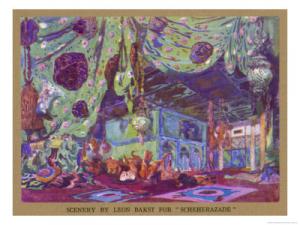Serendip is an independent site partnering with faculty at multiple colleges and universities around the world. Happy exploring!
Notes Towards Day 24: Tacking on Morals?

|
mkarol: The ELF source includes pictures along with the actual words, which relates to the graphic aspect of graphic narratives, but I really didn't pay close attention to them... [here's an invitation to do so...] "Scheherazade Went on with Her Story." |
And so did Satrapi... |
I. coursekeeping
aybala's notes
for Thursday's class: view episode 14 of
the current/6th season of House, M.D.:
per nk0825: (“Private Lives”) deals with an addicted blogger who has become so attached to her audience that she does things in order to please and entertain her readers. This addiction comes into play when she makes a medical decision based on the audience’s opinion. When I saw this episode I couldn’t help but think of how interesting it was to watch as a student who has recently studied blogs. The episode faces many of the same questions we asked ourselves about the relationship between bloggers and their audiences during the first few weeks of the semester, and I feel like watching this towards the end of the class would bring our discussion of material full-circle.
that's the relevant content, original reason for the selection;
but you can think also now about the relevance of form:
how well might 1001 Nights work as ancestor to the t.v. serial?
given that cultural context, what do you notice about the GENRE?
(to have this discussion: please watch also either the episode before
or after this one: Episode 13, "5 to 9," or Episode 15, "Black Hole")
...or (given the experience of TPB1988 and others--I don't think these stories were meant to be read out of order without have the prelude from the first story to set up the atmosphere)--the pilot for the whole series?
Friday by 5 p.m.: your on-line papers are due;
remember to tag 'em "Genres Web Paper 3"
Heads up also for our last class, next Thursday:
final performances of "what you've learned...."
(report/advice from aseidman, aybala, jrf, jrlewis,
Shayna, skindeep, who have done this before...?)
come Tuesday ready to declare your
group affiliations for this open-ended/
show where you've gone "exam"!
![]()
Virginia Sterrett: "The Princess Had Great Beauty"
II. turning to a close(r) reading of individual tales
very striking to me, in your reports of what you read,
how little attention you paid to what edition or editor you'd read
(though I had asked you specifically to identify 'em),
you just gave me the website (or not!), not the translator or era
that gap really highlights one question
about how to talk about world lit:
is it more-or-less important to
locate the axes of space-and-time?
the hand of the author or translator?
the context in which they worked?
are we seeking some sort of "universal" experience?
can/should we ignore the particularities of sites of origin or reception?
rachelr: I started with the Harvard Classics site, but I did not really like the translation ... I switched over to ELF, which I found much easier to follow ... it would be interesting to look at more editions and translations to see how much of a variation there is between tales
From the Facebook discussion board
on Rethinking World Literature:
"Is the New Global Novel Dull?" Yes!
"From the moment an author perceives his ultimate audience as international rather than national ... one notes a tendency to remove obstacles to international comprehension ... contemporary authors ... offer us works that require no such knowledge or effort, nor offer the rewards that such effort will bring."
break into small groups based on your (ostensible!) sources-->
Electronic Literature Forum:
(Herbie)
rachelr, rmeyers, mkarol, xhan;
aybala, sweetp, teal, Molly
Harvard Classics Online:
sbg90, jrf, nk0825;
spleenfiend, skindeep
Haddawy <- Mahdi: jrlewis
??? TPB 1988, Shayna, aseidman
many of you commented on the teaching function of
the tales (and your frank disinterest in such instruction!)
TPB1980: each of the selections I chose seemed to have a similar moral to tell.
rmeyers: all repeated to some degree the lesson that you shouldn't stick your nose where it doesn't belong.
Molly: don't really like stories that are fables or fable-esque. I think there are only so many ways you can express the same moral in a story, and it's sort of been done to death.
rachelr & aybala also commented on the importance of reading the tales in order (presumably also for instructive purposes?)
BUT! STOP!
ShaynaS: A few of us have mentioned finding morals at the end of the stories. I'm curious as to if there really are suppose to be morals in these stories. The context that they are told in does not seem to warrant this ... unless we think of the stories as nudges actively affecting the behavior of the king. Is this intentional? Or are we just like the Duchess from Alice in Wonderland, trying to tack morals onto anything for the sake of having them?
cf. WebPapers2 by rmeyers and sgb90:
what happens to analytical work when it encounters texts
that challenge/mock the consistency/transparency of language, narrative, intellectual work altogether? (how to do it??)
Karla Mallette's description, via my mini-lecture, of the original reception of these tales in Europe: "a wonderland marvelously exterior to the chill light of reason that suffused the eighteenth century,” similar in spirit to 17th c. French fairy tale
two others of you highlighted less the instructional
than the dream-like quality of the stories (or both):
jrlewis: I thought that this text was especially appropriate to read in bed before sleeping. I was with the king and the younger sister, a fellow listener. The stories distracted me to the point of losing sleep or oversleeping the next morning. The interlaced serial nature of the text was incredibly addictive. I found myself craving another tale and another tale after that....
sweetp: I love how the stories flow into each other, making a seemingly endless storyscape .... throughout these stories ran a theme of sparing life, which I liked.
(hm...dream w/ a moral??)
following jrf, re Alice in Wonderland: if a dream-analysis is a method whereby the dreamer can successfully work out/solve a deep-seated problem whose existence the conscious faculties will not allow themselves even to admit, what is the result of our immersion in a dream narrative?
Look together @ the prologue/introduction and whatever stories you have read, to think through these interlaced matters of moralizing and dreaming:
- did you feel instructed (or nudged)
to read and respond in a certain way?
- would you call the framed tale a teaching structure?
and/or a dreaming structure? (why/why not?) - how are they like/different?
- are the particular stories you've read teaching tales?
and/or how do they seem to you like dream tales? - what's the relation between instructing, teaching, and dreaming?
- what is the (moral?) outcome of your reading experience?
- is it possible to read without deriving a moral from the experience? cf. jrf & skindeep re "holy moments":
I had thought of holy moments as instants ... that caused complete engagement ... moments where the usual distance between one's self and one's surroundings (one's conscious thought/"mental cognitive ability", I guess?) seems to disappear. I hadn't thought to imagine complete engrossment in a work of fiction (in whatever form) as an extended holy moment ... the willful putting-aside of critical thought to lose oneself in whatever's on TV ... letting television take over my brain ... doesn't feel transcendent or like it's somehow connecting me more closely to the universe ....
_____________
cf. Burton's opening: In the Name of Allah, the Compassionating, the Compassionate! PRAISE BE TO ALLAH - THE BENEFICENT KING - THE CREATOR OF THE UNIVERSE - LORD OF THE THREE WORLDS - WHO SET UP THE FIRMAMENT WITHOUT PILLARS IN ITS STEAD - AND WHO STRETCHED OUT THE EARTH EVEN AS A BED - AND GRACE, AND PRAYER- BLESSING BE UPON OUR LORD MOHAMMED - LORD OF APOSTOLIC MEN - AND UPON HIS FAMILY AND COMPANION TRAIN -PRAYER AND BLESSINGS ENDURING AND GRACE WHICH UNTO THE DAY OF DOOM SHALL REMAIN - AMEN! - O THOU OF THE THREE WORLDS SOVEREIGN! AND AFTERWARD. Verily the works and words of those gone before us have become instances and examples to men of our modern day, that folk may view what admonishing chances befell other folk and may therefrom take warning; and that they may peruse the annals of antique peoples and all that hath betided them, and be thereby ruled and restrained. Praise, therefore, be to Him who hath made the histories of the past an admonition unto the present! Now of such instances are the tales called "A Thousand Nights and a Night"...
cf. with Lang's abridgement: In the chronicles of the ancient dynasty of the Sassanidae, who reigned for about four hundred years, from Persia to the borders of China, beyond the great river Ganges itself, we read the praises of one of the kings of this race, who was said to be the best monarch of his time....The two sons who survived him loved each other tenderly, and it was a real grief to the elder, Schahriar, that the laws of the empire forbade him to share his dominions with his brother Schahzeman....
It was ...with the deepest shame and sorrow that he accidentally discovered, after several years, that she had deceived him completely, and her whole conduct turned out to have been so bad, that he felt himself obliged to ... put her to death. The blow was so heavy that his mind almost gave way...so every evening he married a fresh wife and had her strangled the following morning...
cf. also Lane's (via Harvard Online Classics) version: PRAISE be to God, the Beneficent King, the Creator of the universe, who hath raised the heavens without pillars, and spread out the earth as a bed; and blessing and peace be on the lord of apostles, our lord and our master Mohammad, and his Family; blessing and peace, enduring and constant, unto the day of judgment.To proceed:—The lives of former generations are a lesson to posterity; that a man may review the remarkable events which have happened to others, and be admonished; and may consider the history of people of preceding ages, and of all that hath befallen them, and be restrained. Extolled be the perfection of Him who hath thus ordained the history of former generations to be a lesson to those which follow. Such are the Tales of a Thousand and One Nights, with their romantic stories and their fables....
and what about the fact that the frame doesn't "close"....? does the sultan learn a lesson? does he stop killing young girls? change his views about the nature of women....? do we lose sight of these larger framing questions, over the course of reading 1001 tales....?


III. in this context, let's re-think Scheherazade
as Satrapi's literary foremother....
what do you say?
how might constructing this particular
historical lineage be helpful (or not?)
is the graphic novel (because always double)
a "teaching structure" (because highlighting gaps)?
jrf: I'm looking forward to exploring the connections between these stories and Persepolis, because to me the styles seemed very different.
Shayna: I'm not sure if I see any immediate connections with Persepolis from the stories I read. The style of the translation is very different than that of the graphic novel. When reading the stories, I felt different from when I am reading a Western book. It felt almost like I was reading a script or a transcript. The stories stayed stories and didn't engross me into believing in the stories themselves. Instead, I felt like I was being told a story, like I was listening to the text.




